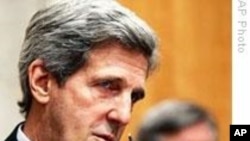Experts at a Senate Foreign Relations Committee hearing on Thursday advocated a U.S. strategy in Afghanistan that focuses more on political and economic initiatives than on a military surge. The hearing comes as President Barack Obama is meeting with his top advisers to help him formulate a new strategy for the region.
Senate Foreign Relations Committee Chairman John Kerry began the hearing by highlighting what he called "a landmark change" in the relationship between the United States and Pakistan, as new legislation - co-sponsored by Senator Richard Lugar and approved by both houses of Congress - would triple non-military U.S. assistance to Pakistan.
"The Kerry-Lugar initiative signals our determination to put the relationship on a new foundation, with the aspirations of the people of Pakistan front and center," said Senator Kerry.
The three experts invited to testify before the committee welcomed the increased aid to Pakistan.
But in considering how the United States should move forward in Afghanistan, all three warned of the failure of other countries' attempts to deal with Afghanistan in the past - including occupations by the Soviet Union and Britain.
Milt Bearden is a former Central Intelligence Agency station chief in Islamabad.
"The Soviets spent 10 years, with an average troop strength of 120,000," said Milt Bearden. "This was always enough to fuel an insurgency that matched every effort that they put out to quell the insurgency. But it never, ever was enough to defeat that insurgency."
Bearden said there will always be enough ethnic Pashtuns in Afghanistan who view any foreign force as an occupation and who will engage U.S. troops on the battlefield.
The former CIA officer spelled out his view of how likely a surge in U.S. military forces would be to succeed.
"There is no, in my opinion, there is no possibility for the United States to provide enough troops in Afghanistan to pacify the situation," he said.
Another expert at the hearing, Maleeha Lodhi, a former Pakistani ambassador to the United States, also said that a U.S. military escalation would be unlikely to succeed and would intensify rivalries in the region, such as the one between India and Pakistan.
Lodhi warned of other negative consequences of a military surge in Afghanistan on Pakistan.
"It will lead to an influx of militant and al-Qaida fighters into Pakistan," said Maleeha Lodhi.
Lodhi warned that a surge in U.S. troops would enhance the vulnerability of U.S. and NATO ground supply routes throughout Pakistan, and would likely mean more Afghan refugees pouring into Pakistan.
She said, most importantly:
"It could endanger, erode and unravel the key public consensus that has been achieved in the past one year to fight the militancy," she said.
Lodhi said a fragile consensus has been formed among the general public in Pakistan to fight against the Pakistani Taliban.
Steve Coll, President and CEO of The New America Foundation, a Washington-based public policy institute, agreed with the other panelists at the hearing that neither an abrupt withdrawal of all U.S. forces nor a troop surge is the answer.
Coll said there is a more sustainable solution, and he hopes it is the one President Obama will choose.
"It would make clear that the Taliban will never be permitted to take power by force in Kabul or major cities," said Steve Coll. "It would seek and enforce stability in Afghan population centers, but emphasize politics over combat, urban stability over rural patrolling, Afghan solutions over Western ones. And it would incorporate Pakistan more directly into creative, persistent diplomatic efforts to stabilize Afghanistan and the region."
Senior members of the Obama administration are reported to be divided over whether to scale back U.S military involvement in Afghanistan or to add thousands of additional troops as part of a request made by the top U.S. and NATO commander in Afghanistan, Army General Stanley McChrystal.
News
Experts Caution Senators Against US Military Surge in Afghanistan
update

<!-- IMAGE -->



